NIHON SPINDLE
100 years of history and the DNA of the art of manufacturing

Dry Booth & Jet Paster by Nihon Spindle
DRY BOOTH
In detail, what is “Dry Booth”?
The ultra-low humidity environment, previously only available in dry rooms, is now offered in a curtain booth system.
When compared to dry rooms, this innovative technology provides a compact, adaptable, and energy-saving ultra-low humidity space.
Therefore, NS Dry Booth can achieve humidity levels in manufacturing and development environments that are particularly sensitive to air humidity. For example, lithium-ion batteries, capacitors, and other chemical compounds. Otherwise, it would be impossible to achieve with standard air conditioning. Nonetheless, Nihon Spindle takes full advantage of the cleanroom and precise air conditioning technologies. Given that we’ve developed over the years to offer our customers the best low-humidity rooms possible.
To clarify, Benefits over conventional dry rooms (In-house comparison)
High-performance specification
When compared to dry rooms, curtain booths have more layout possibilities. Therefore, making it easier to move equipment, perform maintenance, and connect utilities.
Work on the installation can also be expedited greatly.
Energy-saving operations
Additionally, dew point temperature rises quickly, allowing operation only when necessary.
To emphasize, energy-saving operation is possible throughout the year.
Space-saving
For one thing, the temperature control dehumidification unit has been made compact by putting the dry dehumidifier on the temperature controller.
Down-flow system on all sides
Specifically, the down-flow system on all sides ensures that dry air reaches every corner of the booth effectively.
NS Dry Booth – TCL-203WUB−D04 DP-40°C
Since the FIRST model of dry booths changed conventional wisdom.
Moreover, the low dew point space that could only be achieved in a dry room or glove box is now available in a curtain booth type.
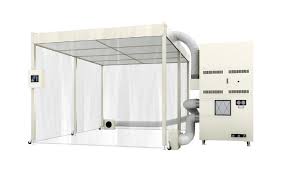
STANDARD TYPE
Specifications
| Performance | Air-vent dew point temperature < -55C * Inside dew point temperature <-40C |
| Booth | Outer dimensions: 3000D-3000W-3050H (mm) Excluding protrusions Main body material: Steel plate pipe frame Curtains: Antistatic vinyl curtains Ceiling: Double-sided color steel plate heat-insulating nonflammable panel |
| Dry Thermal Cube | 1000D-2000W-2000H (mm) Excluding protrusions |
- Dew point temperature varies depending on ambient temperature and humidity conditions, circulating air temperature and humidity conditions, etc.
APPLICATION
Particularly, Lithium-ion battery (LiB) electrodes, fuel cell electrodes, capacitors, separators, etc.
Dry Booth – TCL-203WUB−D08 DP-80°C
In fact, a new ultra-low dew point version for the NS Dry Booth is now available.
Explicitly, with a stylish design and coloring suitable for the next generation. All in all, it provides optimal ultra-low dew point space.
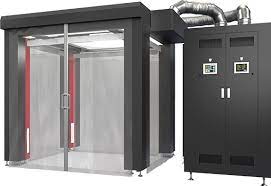
ULTRA-LOW DEW POINT TYPE
With attention to the Specifications
| Performance | Air-vent dew point temperature <-80C * Inside dew point temperature <-70C |
| Booth | Outer dimensions: 2000D-2000W-2300H (mm) Excluding protrusions Main body material: Steel plate pipe frame Curtains: Antistatic vinyl curtains Ceiling: Double-sided color steel plate heat-insulating nonflammable panel |
| Dry Thermal cube | 1000D-4250W-1910H (mm) Excluding protrusions |
- Thus, the Dew point temperature varies depending on ambient temperature and humidity conditions, circulating air temperature and humidity conditions, etc.
JET PASTER by Nihon Spindle
Continuous production
Instant & through dispersion
No agglomeration
Preservation of particles.
In detail, What is JET PASTER?
In detail, the JET PASTER produced by Nihon Spindle is a device for absorbing, dissolving, and dispersing powders.
All things considered, the manufacturing process of batteries is multi-staged and highly complex. In short, preparing electrode slurries is a critical process step that influences the electrochemical performance, or capacity, of the finished product. Thus, planetary mixers are currently used to prepare electrode slurries. Slurry preparation with conventional mixers presents challenges such as agglomerate formation and primary particle breaking due to high-shear force. Altogether, the processes take a long time and take up a lot of space in the plant.
Furthermore, the use of NMP raises concerns about sustainability and cost. Jet Paster’s novel manufacturing method employs microbubbles to promote superior dispersion of powder materials such as CNT while preventing pulverization of the active materials. In brief, Jet Paster reduces production time by up to one-fifth of traditional methods.
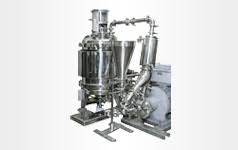
Important to realize, APPLICATIONS
| Batteries | Such as Lithium-Ion batteries, capacitors, fuel cells, binders |
| Pharmaceutical | Specifically, Medical patches, ointments, etc. |
| Chemicals | In particular, High molecular composite, toner, coating agents |
| CNF | Namely, (Cellulose Nano Fiber) |
| Cosmetics | For instance, Emulsion, sunscreen, etc. |
As can be seen, an innovative manufacturing method for Li-Ion Battery & Ultra Capacitor

The Cavity Effect
Therefore, the high-speed rotor causes the decompression drawing of dry ingredients. Thus, the cavity effect creates microbubbles that collect particles. Then, the expansion and contraction of the microbubbles break the particle clusters without affecting the primary particles’ integrity.

Space & Time Savings
Such as moving away from batch mixing methods, Jet Paster saves floor space with its compact design and eliminates the necessity of premix and final dispersion processes. Process time reduction by as much as 1/5. ((Hence, the slurry preparation time may vary depending on various conditions.) When processing aqueous-based slurries, eliminating an NMP recovery process can result in some additional savings.

pH control by CO2
Surprisingly, The slurry neutralizes quickly when the CO2 Gas Unit is employed. With this slurry preparation method, the choice of the binder has expanded, enabling the design of high value-added batteries (environmentally friendly characteristics, high output characteristics, and so on.) In fact, there are several high-capacity cathode active materials to choose from. Indeed, the organic solvent recovery process is no longer needed.
To point out, General examples of capability for dispersion & dissolving
| Powders | Poder feeding method | Capacity (kg/h) | Density (%) | Slurry Amount (kg/h) | Slurry viscosity (mPa.s) |
|---|---|---|---|---|---|
| LiB Cathode materials (Li Metal oxide) | Hopper + Poder feeding device | ~ 300 | 50 ~ 70 | 300 ~ 600 | 1000 ~ 10000 |
| LiB Anode materials (Carbon etc.) | Hopper + Poder feeding device | ~ 300 | 40 ~ 50 | 600 ~ 750 | 1000 ~ 10000 |
| Activated carbon | Hopper + Poder feeding device | ~ 100 | 25 ~35 | 250 ~ 400 | 1000 ~ 10000 |
| PVDF | Hopper + Poder feeding device | ~ 50 | ~ 12 | ~ 400 | ~ 1000 |
| CMC | Hopper + Poder feeding device | ~ 10 | 1 ~ 2 | 500 ~ 1000 | 1000 ~ 5000 |
| CNF + Inorganics | Hopper + Poder feeding device | ~ 20 | 10 | 200 | ~ 10000 |
To clarify, “CAVITATION” – JET PASTER’s KEY TO MILD AND FAST DISPERSION
Surely, how it works-
- As a result, decompression caused by high-speed rotation of the rotor attached to the dispersion head draws the powder into JET PASTER.
- Hence, the powder mixes with the liquid, its wettability improves, and agglomerates are rarely formed.
- Furthermore, dispersion occurs due to the expansion/contraction of bubbles (micro-bubbles) produced by cavitation. As a result, the “mild” dispersion is completed quickly, with the secondary particles disintegrated but the primary particles not pulverized.
In detail, MORE INFORMATION ABOUT CAVITATION, CLICK HERE!
SYSTEM INTEGRATION
To sum up, there are two ways to integrate JET PASTER into the flow of slurry making depending on the situation.
Circulation System
With this in mind, For Deep Dissolving, High Dispersion
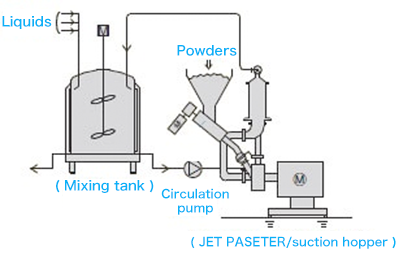
For example, Improve the current process
– That is to say, use in final Dispersion
Thus, position JET PASTER after the current mixer to shorten cycle time and acquire better dispersion
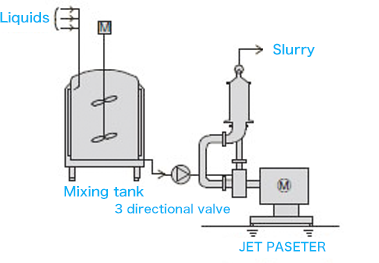
PRODUCT LINE-UP
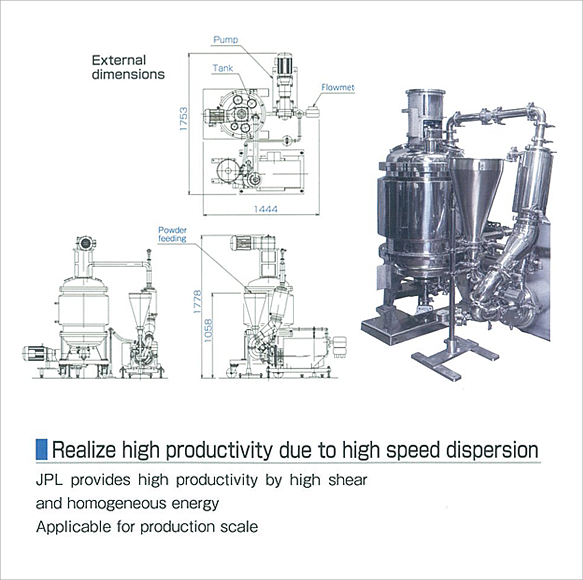
To point out, High-speed dispersion allows for increased productivity.
Obviously, the JP-L has high productivity due to its high shear and homogeneous energy.
Surprisingly, suitable for the production scale.
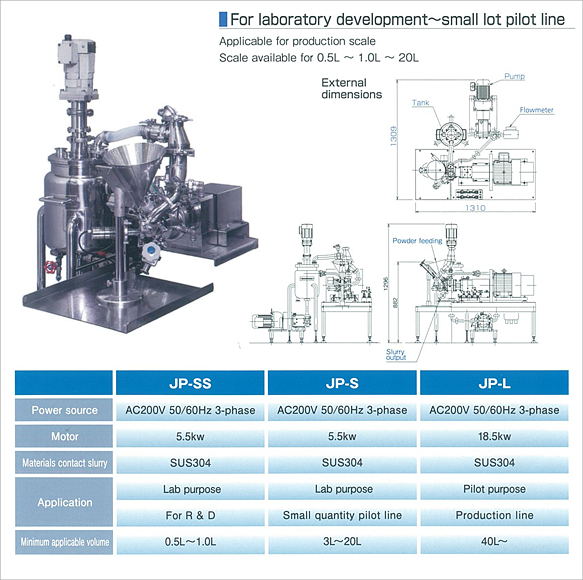
For instance, Laboratory use and a small lot pilot line.
In short, suitable for a small lot production.
Then, the available capacity of 0.5L~1.0L~20L.
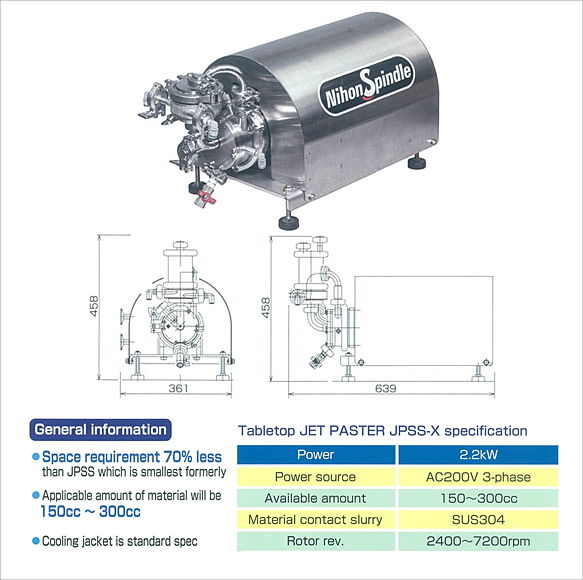
To sum up, The perfect tabletop version of JET PASTER
Further, the capacity (material amount) is 150cc~300cc
As standard. Thus, a cooling jacket is included.
Preparing Aqueous-Based Cathode Slurry
Henceforth, Issues with high-energy cathode active material
In the final analysis, the next-generation cathode materials, Nickel-rich ternary material, and NCA are promising. However, manufacturing electrodes with these materials is complicated.
For example, (PVdF type: Gel formation of the slurry. In detail, aqueous base: Corrosion of AI current collectors)